UK's first Peace Studies turns 50
In the University of Bradford archives, there is a copy of a letter addressed to former Prime Minister Ted Heath, asking if he would contribute to a Quakers' appeal to fund a School of Peace Studies.
-1-555x396.png)
It was the early 1970s, the Vietnam War still raged on, but in a pocket of Yorkshire, a bold and ambitious campaign of hope was being carried out.
Now, celebrating its 50th anniversary, those involved in shaping the UK's first Peace Studies School into one of the world's leading centres of conflict resolution and international development look back on a colourful - and sometimes controversial - history.
Professor Anand, Head of Department at the University of Bradford, said: “It has been a success against all the odds - being located far out of the capital city, in a place that is usually associated with successful pre-Victorian era female authors of Haworth and Victorian era industrial philanthropists such as Sir Titus Salt, but no ready connection with wars or peace deals. I think that is the uniqueness of this department. It seems to shout out that if you have a will, it is possible to make a difference.”
Ambitious beginnings
The idea for a School of Peace Studies in the Yorkshire city first came about in 1964, two years before the Bradford Institute of Technology became a university.
While devising the Charter of Statutes, Principal Dr Ted Edwards and Vice Principal Robert McKinlay - who became the University’s first Vice-Chancellor and Pro-Vice Chancellor - agreed that, when the time was right, they would found such a school to fulfil their commitment to the “application of knowledge to human welfare.”
By the end of the decade, The Society of Friends - known as Quakers - had the same thought and approached a number of UK universities with the idea.
Bradford was the only institution prepared to fund such a centre. McKinlay himself was a Quaker and the idea seemed a good fit for the city where the celebrated writer and social commentator, J.B.Priestley, sowed the seeds for the Campaign for Nuclear Disarmament (CND).
In less than 10 weeks of a public appeal being launched in 1971, the Quakers had raised the required £75,000, including contributions from former Prime Minister Harold Wilson, Chancellor of the University from 1966 to 1985, J.B. Priestley, American violinist Yehudi Menuhin and British composer Benjamin Britten. The University matched the amount of funding.
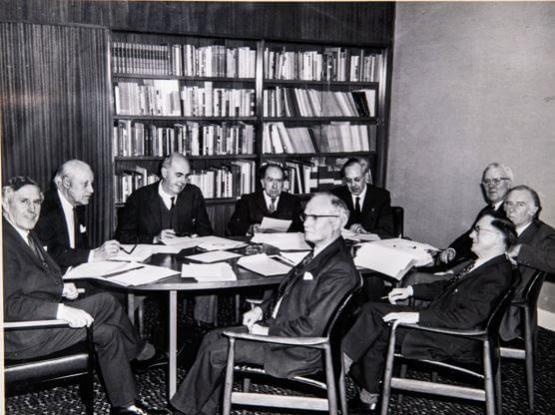
Pictured above: The Appeal Committee, first meeting June 1972.
Adam Curle, an eminent British peace academic who had been involved in conflict resolution in Africa and Asia, was approached to be the centre's first Chair. His colleagues at Harvard University, USA, where he held a prestigious position, were reportedly astonished when he accepted.
Curle’s vision was to train students at all levels, from diploma to PhD, who would go on to work in community or race relations, join international agencies like the UN or Oxfam, or carve out careers in law or education.
In his inaugural lecture, he noted that he and his colleagues had come together not for “primarily intellectual” reasons, but because they “cannot resist the obligations imposed upon us by our experiences in this darkening world.”
He added, in a nod to Martin Luther King’s famous sermon: “I, too, have a dream. I dream of a world in which we are not separated from each other by fear, suspicion, prejudice or hatred; in which we are free and equal, considerate and loving with each other.”
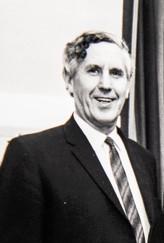
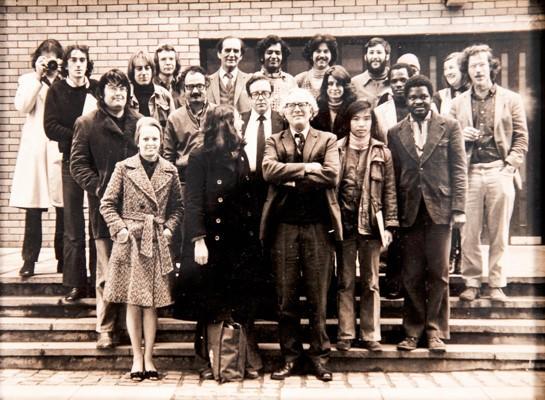
Pictured above: Professor Adam Curle and the first Peace Studies staff photograph
'Experiment in radical education'
Curle established the concept of peace as a wide-ranging and inclusive value and, in 1973, appointed staff who had diverse backgrounds and experience, including Nigel Young on Gandhi and nonviolence, Vithal Rajan on International Development, Aleks Stromas on the Soviet Union, Uri Davis, on the Middle East and Michael Harbottle, former Chief of Staff for the UN Peacekeeping Force in Cyprus, on UN Peacekeeping.
The first cohort of students started on the Master’s degree in October 1974.
Tom Woodhouse, Emeritus Professor of Peace Studies, was one of Curle’s first appointments, joining the University as research assistant. He recalled: “Adam Curle was very charismatic, inspirational and imaginative. During the early years, Peace Studies became an experiment in radical education, what Adam Curle called Education for Liberation, with lively debates about the nature of peace and the varieties of skills and methods needed to establish it. It was a challenging and creative environment."
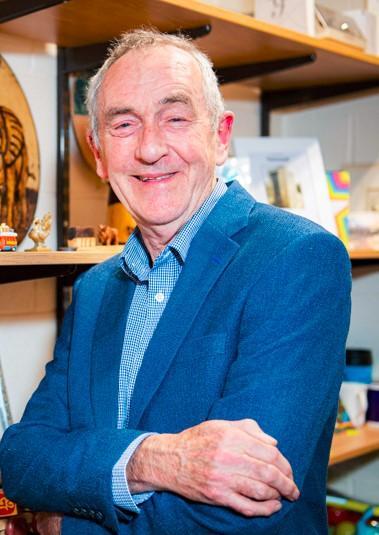
Pictured above: Emeritus Professor Tom Woodhouse
It was conducted as a kind of cooperative, with students encouraged to discuss details of the teaching programme as well as the sorts of qualifications needed in staff. There were some clashes amongst academics, not surprisingly given they were chosen for their “insight, fire and realism,” according to Robert McKinlay's book, The University of Bradford: The Early Years.
In 1978, following Curle's retirement, the department came under the leadership of James O’Connell, but it was still to face one final hurdle. Margaret Thatcher came to power the following year and, with knowledge from her previous post as Secretary of State for Education, was concerned that the School was not so much a serious academic institution, but rather a potentially destabilising campaign group calling for the abolition of nuclear weapons.
It's believed that, at one point, she asked: “Has that Peace Studies problem been dealt with yet?” A quote Professor Anand now has on a t-shirt in his office, a gift from a former colleague.
It's thought it was on the Prime Minister's behest that, in the mid-1980s, the then Education Secretary dispatched Sir Peter Swinnerton-Dyer, Chairman of the University Grants Committee, to investigate.
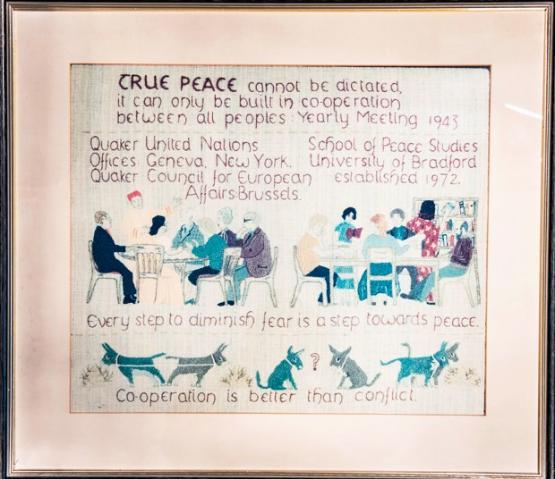
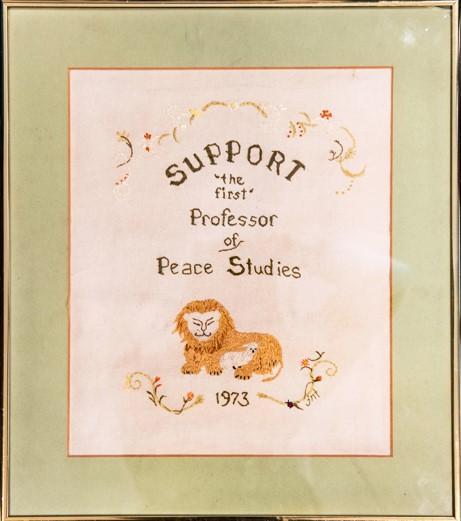
Pictured above: Two tapestries, the first a gift from the Quakers to celebrate the founding of Peace Studies at Bradford, the second Adam Curle's leaving gift from his Harvard colleagues.
Much to the surprise of many, the University passed its inspection with flying colours, boosting the centre’s reputation and Peace Studies remained. Afterwards, the centre began to more closely resemble that of traditional academic schools.
“If it hadn’t, we would have been closed down long ago!” said Professor Anand.
Professor Woodhouse added: “It started as something that was given very little chance of survival and has grown into a global player, now one of the biggest peace studies departments in the world in terms of reputation.”
On the world stage
Over the half century, academics have lent their expertise to organisations including the UK Government, United Nations Peacekeeping and NATO, and worked alongside peacekeepers in conflicts including Israel-Palestine, the Balkan Wars and the Iraq War. Staff have served on the Defence Policy Committee of the Labour Party and for many years maintained a research fellow in London to network with MPs on defence issues.
Professor Paul Rogers, who joined the school in 1979 and was head of department between 1993 to 1999, rose to prominence as a critic of the 2003 Iraq invasion. He said: “In the 1990s, the department expanded and changed rapidly, doing far more work on world issues, gender and conflict, mediation and in particular, post-conflict peacebuilding. Many of our students ended up working in zones of recent conflict, trying to help the healing process.”
Now Emeritus Professor having officially retired in 2010 but often returns to lecture, Professor Rogers is considered one of the leading commentators on strategic issues in conflicts, notching up hundreds of media interviews every year.
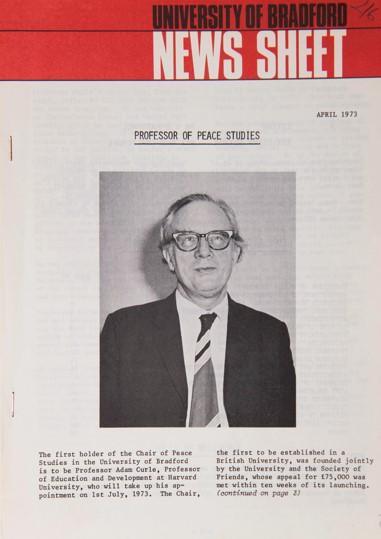
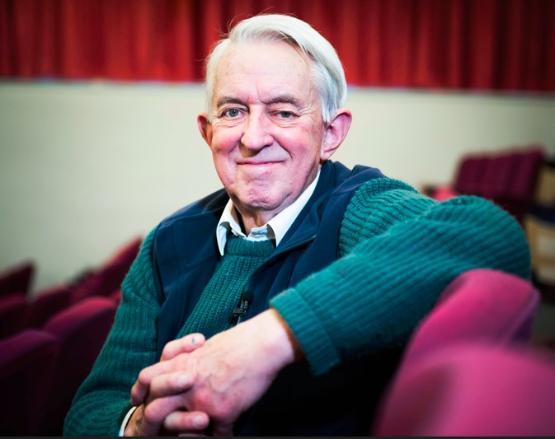
Pictured above: University newsletter announcing Peace Studies, 1973, and Paul Rogers, Emeritus Professor of Peace Studies
Professor Rogers said: “Looking back on it, it’s always been a rollercoaster. You have academics and students who feel very strongly about what they’re doing and may not always agree. That's inevitable and healthy, but it makes the management quite tricky at times. At the same time, it was like riding a tiger, you learned a heck of a lot in the process.
“Because we had students from all over the world, you would meet people from particular areas of conflict, which was invaluable. We could hone in on what we knew in theory with what the students were telling us in practice.”
In 1998, celebrations for the Silver Anniversary included a reception at the House of Lords with then foreign minister Robin Cook. Two years later, Clare Short, then International Development Secretary - a newly appointed post in Tony Blair’s Government - visited. In honour of that, the University's Development and Project Planning Centre became the Bradford Centre for International Development.
In 2016, that centre merged with Peace Studies to create the Centre for Peace Studies and International Development. Within such a wide remit, it is also very focused on sustainability.
Alumni have gone on to work in international peacekeeping, humanitarian and development organisations, the most high profile being the late Saeb Erekat, veteran Chief Negotiator for Palestine.
Football, Fellows and the Future
Today, there are 75 students on the BA International Relations, Politics and Security Studies and more than 600 across eight Master's programmes, as well as PhD students.
As one of seven Rotary Peace Centres across the globe - and the only one in the UK - the University hosts 10 fully-funded MA Rotary Peace Fellows from all over the world every year. Getting a place on the 15-month programme is highly competitive, with Fellows expected to have several years of professional experience, an excellent academic record and an ability to positively impact world peace in their future careers to win a place at Bradford, which receives more applications than any other Rotary Peace Centre.
One highlight of the Centre's extracurricular calendar was the Tolstoy Cup, a football match between the Department of War Studies at King’s College, London and Bradford’s Peace Studies, named after the author of War and Peace, and hailed in the Financial Times as one of the greatest college sporting rivalries.
While Peace players bore the names of famous peacemakers such as the Dalai Lama, Martin Luther King and Gandhi on their shirts, War Studies students invoked the spirit of Clausewitz and Churchill.
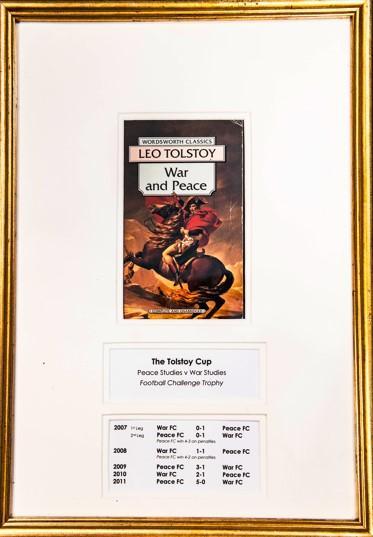
Pictured above: The Tolstoy Cup trophy, a framed copy of Leo Tolstoy's War and Peace
Peace Studies proved the power of peace above war in the very first meeting between the teams, in 1995, when they beat their rivals by a remarkable 15-0.
Professor Woodhouse, President of Peace FC, recalled: “BBC Five Live sent a reporter. Eight minutes in, Peace Studies was three-nil up. I thought, ‘This is going to be a massacre.’
“The Tolstoy Cup was very much a friendly rivalry between the two centres. It was also significant in demonstrating how sport can be used to teach about the dynamics of peace and conflict resolution.”
The last match was played pre-Covid but it’s hoped the tradition could be revived this year.
As well as the day-to-day teaching and research, the Centre receives more than 10,000 applications a year from employees of the African Development Bank - equivalent to our Civil Service - for just 30 places on a prestigious short course.
The Centre also welcomes varying numbers of visiting international students every year through the UK Government’s Chevening scholarship and fellowship programme.
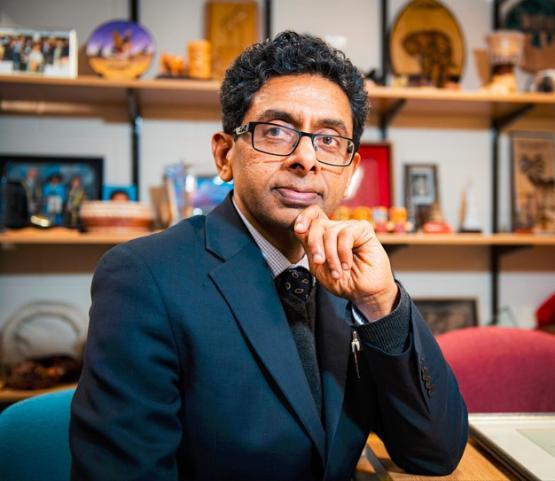
Pictured above: Professor Anand, Head of Department, Peace Studies and International Development
Professor Anand, who is himself celebrating his silver anniversary at Bradford, said the centre will continue to play a vital role in the future.
He said: “Peace is a quest. The human condition and all the challenges we have, such as climate change and food insecurity, are going to need action for the next 20, 30, 40 years. These are not short term, fashionable issues.
"The nature of programmes and research will change in a dynamic world but issues like peace and resolution date back to Aristotle and Plato and we’re still talking about them today. I have no doubt our department will still be carrying out vital research and educating the leaders of tomorrow in another 50 years.”
Professor Amir Sharif, Dean of Faculty of Managment, Law and Social Sciences within which Peace Studies resides, said: "Celebrating the golden jubilee of the establishment of Peace Studies here at Bradford, especially within a time of global challenge and ongoing conflict in many parts of the world, continues to highlight ever more how important this subject is to society at large.
"We are humbled and fortunate to be the current stewards of teaching, research and engagement in this field - and colleagues remain at the forefront of work into the subject area. Our continued links with Rotary International, the Quakers, Allan and Nesta Ferguson Trust and many peace-oriented organisations around the world continue to signal our deep commitment to this key area. We thank all those who support us in this endeavour, and look forward to continue pioneering in peace and conflict resolution for many years to come."
